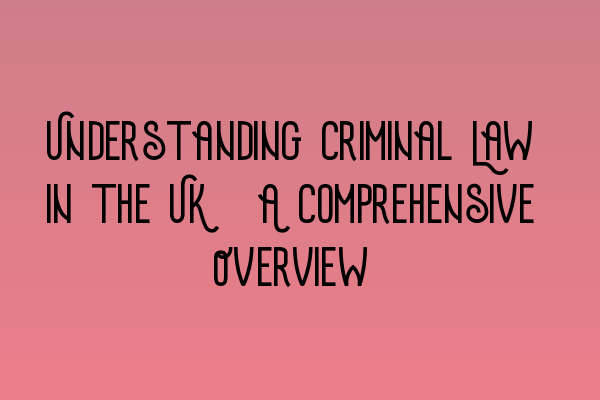Understanding Criminal Law in the UK: A Comprehensive Overview
Welcome to SQE Criminal Law & Practice Law UK, where our team of solicitors strives to provide you with comprehensive knowledge and expertise on criminal law in the UK. Whether you are an aspiring solicitor or simply interested in understanding the workings of criminal law, this blog post will serve as a comprehensive overview, covering key concepts and principles.
1. Introduction to Criminal Law
Criminal law is a fundamental branch of legal practice that governs society’s response to criminal activities. It defines offenses, sets penalties, and establishes legal procedures to ensure justice is served. Understanding criminal law is crucial for legal professionals as well as individuals seeking to protect their rights and navigate the legal system.
Before delving into specific aspects of criminal law, it’s essential to understand the distinction between criminal and civil law. Criminal law deals with offenses against society as a whole, while civil law focuses on resolving disputes between individuals or entities.
2. Elements of a Crime
To understand criminal law fully, it’s essential to grasp the elements that constitute a crime. Crimes typically consist of three components:
- Actus Reus: The guilty act committed by an individual, which can be a physical action or a failure to act when legally required to do so.
- Mens Rea: The mental state or intent of the individual when committing the act. It establishes criminal intent and differentiates between intentional and unintentional acts.
- Causation: The link between the act and the harm caused. It establishes that the accused’s actions directly resulted in the intended or foreseeable consequences.
3. Categories of Offenses
Criminal offenses can be categorized into three main types:
- Summary Offenses: Minor offenses that are tried in the Magistrates’ Court, such as petty theft or disorderly conduct.
- Indictable Offenses: Serious offenses that are tried in the Crown Court, such as murder, rape, or fraud.
- Either Way Offenses: Offenses that fall between summary and indictable offenses, giving the court discretion on whether the case should be tried in the Magistrates’ or Crown Court.
4. Legal Defenses
When faced with criminal charges, individuals have the right to raise various legal defenses. These defenses include:
- Self-Defense: When an individual uses reasonable force to protect themselves or others from harm, which is permissible under the law.
- Mistake of Fact: When a defendant genuinely believes in certain facts that, if true, would make their actions legal. This defense can be applicable if the mistake was reasonable in the circumstances.
- Insanity: If an accused person was suffering from a mental illness at the time of the offense, they may be deemed unfit to stand trial under the defense of insanity.
5. Criminal Trials and Procedures
The criminal justice system in the UK follows a well-established set of procedures to ensure fairness and justice. A criminal trial typically involves the following stages:
- Investigation and Arrest: Law enforcement agencies investigate alleged crimes and, if sufficient evidence exists, make arrests.
- Charging: The prosecution presents the formal charges against the accused based on the evidence gathered.
- Arraignment: The accused is brought before a court, informed of the charges, and enters a plea of guilty or not guilty.
- Pre-Trial Procedures: This stage includes case management hearings, plea negotiations, discovery of evidence, and any necessary pre-trial motions.
- Trial: Both prosecution and defense present their cases, calling witnesses, cross-examining, and presenting evidence. The judge or jury then determines guilt or innocence.
- Sentencing: If the accused is found guilty, the court imposes an appropriate sentence based on the seriousness of the offense, prior convictions, and mitigating factors.
- Appeals: The convicted individual has the right to appeal the verdict or sentence if they believe there were errors during the trial process.
For more detailed information on related topics, please refer to our related articles:
- SQE 1 Practice Exam Questions
- SQE 1 Practice Mocks FLK1 FLK2
- SQE 2 Preparation Courses
- SQE 1 Preparation Courses
- SRA SQE Exam Dates
At SQE Criminal Law & Practice Law UK, we strive to provide comprehensive knowledge and guidance to help aspiring solicitors succeed in their legal careers. Our team of experienced solicitors is dedicated to equipping you with the necessary skills and understanding of criminal law. Stay tuned for more informative articles and resources.
